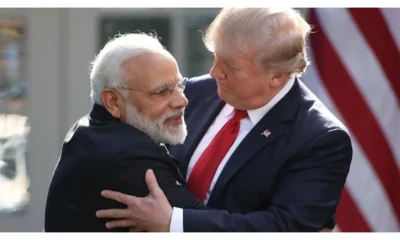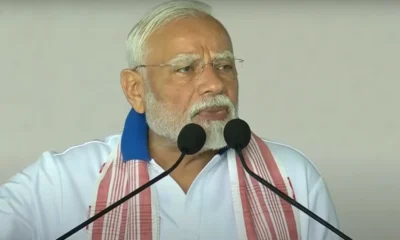India has improved its rank in six out of the 10 indicators and has moved closer to international best practices on seven out of 10 indicators.
India jumped 23 ranks from last year to get 77th rank in the World Bank’s latest Ease of Doing Business rankings, a news that is likely to bring cheer for the Narendra Modi-government in an election year.
The jump is significant, as it comes after last year’s 30-rung climb when India moved into the top 100 rankings among 190 countries.
The report also recognises India as one of the top 10 improvers in this year’s assessment, for the second successive time. India is the only large country this year to have achieved such a significant shift.
India has improved its rank by 53 positions in the last two years, and 65 positions in the last four years (2014-18).
When the NDA came to power in 2014, India stood 142nd in World Bank’s ‘Doing Business’ list.
“We have made progress in leaps and bounds, probably the most significant in the history of Ease of Doing Business,” Union Finance Minister Arun Jaitley said, underscoring that to make significant progress, one has to “literally crack the code” and work on the bottlenecks.
The latest jump comes in an election year, as the government is under opposition attack for the rise in petrol prices, the fall of the rupee and the differences with the Reserve Bank of India. Besides, the Congress has persistently pointed to what it calls the failure of PM Modi’s ‘Make in India’ initiative. Congress chief Rahul Gandhi has consistently attacked the government, saying instead of Make in India, “Everything is made in China”.
The improved ranking will boost the sentiment of Prime Minister Narendra Modi’s government ahead of the general election, at a time it’s facing flak for rising fuel prices and falling rupee. Last year, Finance Minister Arun Jaitley had said Modi wanted various ministries to target the top 50, which he thought was “doable”.
In this year’s assessment, on the “distance to frontier metric”, a measure to gauge how far an economy’s policies are from global best practices, India’s score improved to 67.23 from 60.76 last year.
This means last year India improved its business regulations in absolute terms – indicating that the country is continuing its steady shift towards global standards.
“India continued its reform agenda, implementing six reforms in the past year. India is now the region’s top-ranked economy,” the World Bank said, ahead of Bhutan (81) and Sri Lanka (100), Nepal (110), the Maldives (139), Pakistan (136) and Afghanistan (167) and Bangladesh (176).
India has improved its rank in six out of the 10 indicators and has moved closer to international best practices on seven out of 10 indicators.
The checklist includes ease of starting a business, construction permits, getting electricity, getting credit, paying taxes, trade across borders, enforcing contracts and resolving insolvency, reported news agency Press Trust of India.
The most dramatic improvements have been registered in the indicators related to ‘Construction Permits’ and ‘Trading Across Borders’.
In the ‘Grant of Construction Permits’ indicator, India’s ranking improved from 181 last year to 52 in this year’s report—a jump of 129 ranks in a single year.
In the ‘Trading Among Borders’ indicator, India’s rank improved by 66 positions, moving from 146 in 2017 to 80 in 2018.
India reduced the time and cost to export and import through various initiatives, including the implementation of electronic sealing of containers, the upgrading of port infrastructure and allowing electronic submission of supporting documents with digital signatures, the World Bank said.
The other improvements come through the GST, which wasn’t included in last year’s ranking, and the Insolvency and Bankruptcy Code (IBC). The GST made it easier to start businesses as it integrates multiple application forms into a single general incorporation form. World Bank said this speeds up the registration process.
India, the report said, has not only made paying taxes easier, but also made it less costly by reducing the corporate income tax rate and the employees’ provident funds scheme rate paid by the employer.
The amendements to the IBC also strengthened access to credit, the report said. “Secured creditors are now given absolute priority over other claims within insolvency proceedings.”
Marking areas where the country still needs to improve, Finance Minister Jaitley mentioned starting of business, in which the country ranked 137, paying taxes and enforcing of contracts, which he said “remains poor”.
Besides, in registering property, the country’s ranking fell to 166 from 92 when Modi took over, a report in BloombergQuint added. It takes over two months in India to register for property and the procedures end up costing almost 8 percent of the property value.
India’s efforts in protecting minority investors also stagnated. Its rank fell from fourth in the world to seventh, with no improvement in reforms. Similarly, in paying taxes, the ranking slipped by two places to 121 this year.
Enforcing contracts still remains a huge problem, with the country’s rank at 163. The World Bank report shows that it takes more than three years to enforce a contract and it ends up costing a third of the claim value itself.
In the World Bank Group’s annual ease of doing business rankings, the top 10 economies are New Zealand, Singapore and Denmark, which retain their first, second and third spots, respectively, for a second consecutive year, followed by Hong Kong SAR, China; Republic of Korea; Georgia; Norway; United States; United Kingdom and FYR Macedonia.


 Latest world news18 hours ago
Latest world news18 hours ago
 India News18 hours ago
India News18 hours ago
 Latest world news4 hours ago
Latest world news4 hours ago
 India News3 hours ago
India News3 hours ago
 India News3 hours ago
India News3 hours ago
 India News3 hours ago
India News3 hours ago
 LATEST SPORTS NEWS3 hours ago
LATEST SPORTS NEWS3 hours ago











